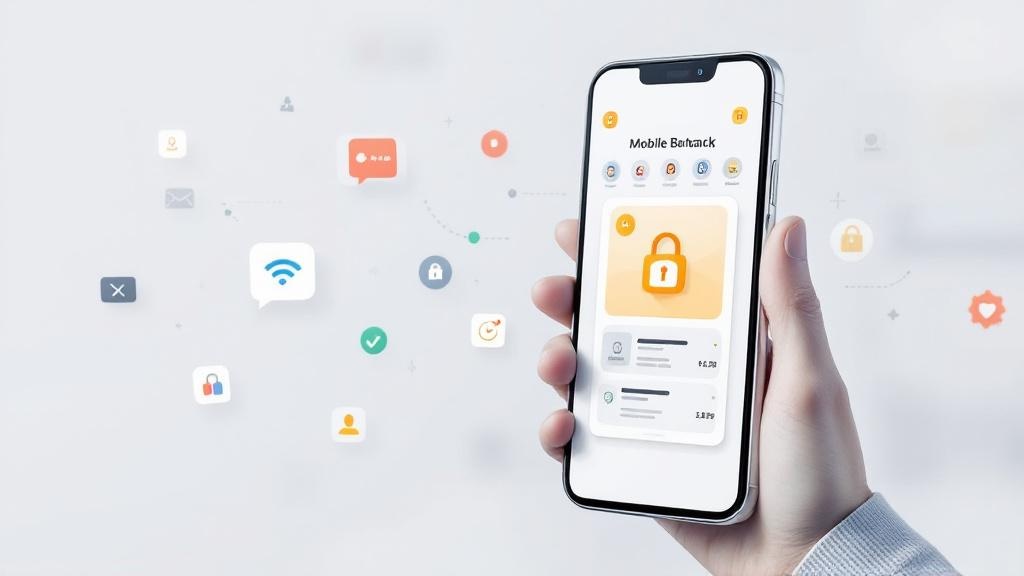When it comes to choosing a mobile banking app, especially for Android users, security and privacy should always be a top priority. Whether you’re managing your savings, transferring money, or keeping an eye on your credit score, the best mobile banking app for Android should provide not only great functionality but also robust privacy features.
In this article, we will guide you through the top Android banking apps and the privacy policies you should review to ensure that your financial data remains safe and secure.
Why Privacy Policies Matter in Mobile Banking Apps
In today’s world, mobile banking security features are as important as the app’s ability to help you manage your finances. When using a mobile banking app, you are trusting the platform with your most sensitive data, including account details, transaction history, and possibly even personal identifiers. The privacy policy of a banking app outlines how your data is collected, used, and shared by the service provider.
Knowing the privacy policies is essential because:
-
Data Protection: Mobile banking apps deal with sensitive information. A strong privacy policy ensures that the app follows industry standards for protecting user data.
-
Transparency: Reviewing the privacy policy helps users understand what data the app collects and how it is used.
-
Legal Protection: Privacy policies define the rights and responsibilities of both the app developer and the user.
As mobile banking grows in popularity, understanding these policies has never been more critical. Let’s break down what you need to look out for when reviewing privacy policies for mobile banking apps.
Key Privacy Features to Look for in the Best Mobile Banking App for Android
1. Data Encryption and Secure Transactions
Encryption is the backbone of mobile banking security. The best banking app for Android 2025 will utilize strong encryption protocols such as AES-256 or TLS encryption to ensure that your data remains safe while in transit. This protects your information from hackers and eavesdroppers.
Look for apps that:
-
Offer end-to-end encryption for all sensitive data.
-
Ensure that financial transactions are encrypted during transmission.
-
Use multi-factor authentication (MFA) to secure your login credentials.
2. User Consent for Data Collection
Many secure Android mobile banking apps collect personal and financial data. A good privacy policy will clearly state how this data is collected, why it’s needed, and how long it will be stored. Always check if the app asks for your consent to access data like location, contacts, and camera. Ideally, it should not access unnecessary information that isn’t required for banking activities.
3. Third-Party Sharing and Data Selling
Some apps share your data with third-party services for marketing or advertising purposes. The most popular Android banking apps should not share your sensitive information with third parties without your explicit consent. Look for apps with clear policies regarding third-party sharing and the option to opt out of data sharing if needed.
4. Cookies and Tracking Technologies
Many Android banking apps with rewards or other promotional features use cookies to track user behavior and personalize the app’s services. Review the privacy policy to understand how cookies are used. The app should provide an option to disable or limit tracking for a more privacy-conscious experience.
5. Access to Personal Information
Check how the app handles sensitive data like your personal identification number (PIN), account number, and password. Ensure the Android banking app with real-time updates never stores sensitive data in an unencrypted format.
Reviewing Android Banking App Features and Privacy Policies
1. Top Android Banking Apps: An Overview
Before diving into the privacy policies, let’s look at some of the top Android banking apps that have set high standards in terms of security and user privacy.
-
HDFC Bank Mobile Banking App
Known for its robust security features, including two-factor authentication (2FA), HDFC’s app ensures that user data is encrypted. The app’s privacy policy highlights that user data is shared only with authorized parties and is not sold to third parties for marketing purposes. -
ICICI Bank iMobile
ICICI’s iMobile app is one of the best mobile banking apps for managing finances. The privacy policy ensures that the bank does not share your financial data with third-party marketers. The app employs strong encryption and allows users to review and manage privacy settings. -
SBI YONO
SBI YONO is a secure Android mobile banking app with features like biometric login, encrypted transactions, and real-time updates. Its privacy policy is transparent, and the app ensures no unauthorized sharing of user data.
2. Android Banking Apps with Free Transfers
Apps like Paytm Payments Bank and Google Pay provide users with Android banking apps with free transfers and competitive exchange rates. Their privacy policies emphasize the safe handling of transactional data, with a particular focus on preventing fraud and identity theft.
What to Do if You Find a Privacy Policy That Concerns You
If you come across a mobile banking app whose privacy policy raises red flags, it’s important to:
-
Review Your Permissions: Disable any permissions that seem unnecessary, like access to your location or contacts.
-
Look for Alternatives: Search for other Android banking apps with free transfers that provide more secure and transparent data handling.
-
Reach Out to Customer Support: If something doesn’t seem clear in the privacy policy, contact the bank or app provider for more information. A reputable provider will be happy to clarify their practices.
FAQs About Mobile Banking Privacy and Security
1. What are the most important privacy policies for mobile banking apps?
The most important privacy policies to look for are data encryption, user consent for data collection, third-party sharing, and protection of sensitive financial information. Always ensure the app follows strict data protection protocols and is transparent about how your data is used.
2. How can I protect my data on mobile banking apps?
Use multi-factor authentication (MFA), avoid using public Wi-Fi for transactions, and always choose apps with strong encryption. Additionally, ensure your app permissions are set appropriately and don’t grant unnecessary access to your personal information.
3. Are there Android banking apps that provide rewards for using them?
Yes, some Android banking apps with rewards such as Paytm Payments Bank and ICICI iMobile offer cashback and rewards for transactions. However, always review their privacy policies to ensure your personal data is not being misused for marketing purposes.
4. What is the best mobile banking app for Android 2025?
The best mobile banking app for Android 2025 will have excellent security features, a clear and user-friendly privacy policy, and allow for easy financial management. Apps like HDFC Mobile Banking, ICICI iMobile, and SBI YONO are popular choices that prioritize user security and privacy.
5. How do I know if a mobile banking app is secure?
A secure mobile banking app will use end-to-end encryption, multi-factor authentication, and clearly outline how it handles and protects your data. Check the app’s privacy policy and user reviews to see if it meets industry standards for security.
6. Can I use a mobile banking app for managing my credit score?
Yes, some Android banking apps with credit score tracking like ICICI Bank iMobile or Paytm offer integrated credit score tracking. These apps usually pull data from credit bureaus and provide regular updates on your creditworthiness.
7. What are the best Android apps for managing bank accounts?
Apps like HDFC Mobile Banking, ICICI iMobile, and SBI YONO are some of the best personal finance apps for Android. They offer a range of features like bill payments, transfers, and financial tracking, all while adhering to strict privacy standards.








Comments (0)